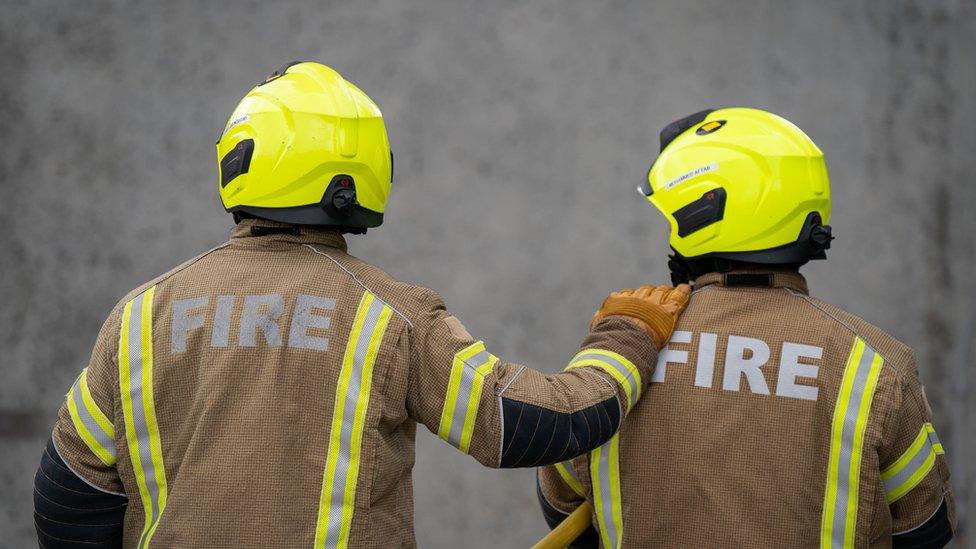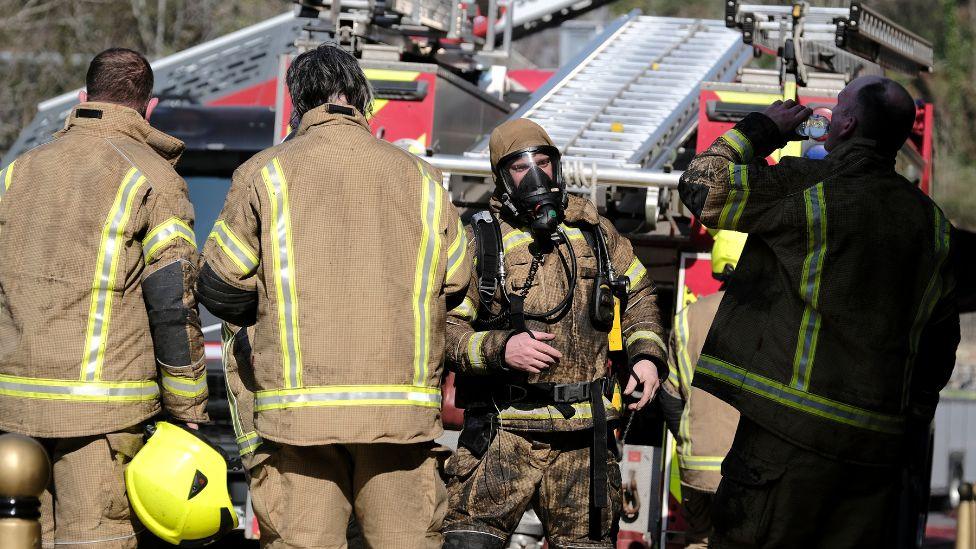Firefighters face higher cancer risk, Scottish study finds
- Published

Researchers studied mortality among Scottish firefighters
Firefighters are more likely to die from cancer, heart attacks and strokes than the general population, research has found.
A study of the emergency service staff in Scotland said their cancer mortality rate was 1.6 times higher than others.
Firefighters are also five times more likely to die from heart attacks and nearly three times more likely to die from strokes, the report said.
The researchers said exposure to toxic substances was a likely cause.
The Scottish Fire and Rescue Service said staff safety was "paramount".
The study, by the University of Central Lancashire, looked at mortality data from the National Records of Scotland.
It found the number of firefighters who have died from prostate cancer was 3.8 times higher than the general population, 3.2 times higher for leukaemia, and 2.4 times higher for oesophageal cancer.
And in instances where cancer with an unknown origin has spread, the rate was 6.4 times higher than the general population.
The report said excess cancer mortality was likely linked to different kinds of exposures and fire toxins.
Cancers of the oesophagus and digestive organs point, for example, to a potentially significant contribution from ingestion, which may occur when firefighters swallow mucus in which fire effluent has become trapped, or if they have eaten food with contaminated hands.
And mortality rates from leukaemia are linked to exposure to other chemicals such as benzene from contact with skin or inhalation.

There was no explanation for my cancer

A part-time firefighter who has returned to work after cancer treatment said he was "concerned" by the new research.
Iain Barbour fell ill in the summer of 2020 and by that October he had lost around four stone and was surviving on a liquid diet of soup and water.
An endoscopy at the Victoria Hospital in Kirkcaldy later confirmed his oesophagus was "75% blocked" by a cancerous tumour.
Mr Barbour, of Cupar, Fife, said he struggled to comprehend the news as he had never been off sick and never had any ill health.
As a non-smoker and a rare drinker he was also asked what his occupation was.
But Mr Barbour, 58, said there was "no explanation" and medics could not say what caused his cancer.
Asked about the study, he told BBC Scotland: "I would be concerned, like every firefighter you would be concerned.
"We welcome any research and findings that come out of this campaign."
The father-of-one underwent a nine-hour operation in February 2021 and returned to work last November.
He added: "It was always a goal when I was off sick and the target was always to get my fitness back to get back in the job and it most certainly kept me going through some pretty dark days."

Researchers noted a downtrend in the number of cancer deaths in the general population, citing an increasing availability of lifesaving measures like early diagnosis and effective treatment. But they identified an opposite trend among firefighters.
The study found firefighters appeared to have higher cancer rates at younger ages and were too young to be offered cancer screening on the NHS.
Colin Brown, of the FBU Scotland, said the study confirmed what was common knowledge among the profession.
He added: "We did not have the the facts and figures and the truly shocking percentages but there is very few firefighters who won't know someone, a work colleague, who either has a diagnosis of cancer or sadly has already died of cancer.
"This is our asbestosis crisis and we have argued that for some time."

Colin Brown of he FBU Scotland said he was alarmed by the statistics in the study
Mr Brown told BBC Scotland the main threat was the cumulative exposure of firefighters to fumes emitted by burning materials, such as plastic and insulation foam.
He also highlighted the risks associated with wildfires, which officers often tackle for hours at a time without breathing apparatus.
The FBU official said cancer cases seemed to spike after 15 years' service and described the situation as a "health crisis".
Mr Brown added: "We can't remove the risk because fires contain these toxic chemicals but we have to take measures in order to protect this group of workers, firefighters, in their workplace."
The research team, led by Professor Anna Stec, looked at the records of 672 firefighters aged between 30 and 74.
Their findings, based on mortality figures between 2000 and 2020, have been published in the Journal of Occupational Medicine.
Ms Stec, professor in fire chemistry and toxicity at the university, said: "It's important that firefighters can continue to do their jobs as safely as possible, and the research shows that measures such as health monitoring and reducing exposure from contaminants at the workplace will play an important part in protecting firefighters."

Scottish Fire and Rescue Service (SFRS) Assistant Chief Officer Andy Watt said the organisation would review the findings of the research.
He added: "The service has already undertaken work to minimise the risk of contaminants for our staff. This includes a substantial review of how fire appliances, personnel and PPE are decontaminated during and following an incident.
"All fire appliances and training centres have been provided with specialist decontamination wipes, we have trialled station zoning systems to limit potential spread and our standard medical tests involve enhanced cancer screening questions.
"We will continue to work in partnership with the FBU and Professor Anna Stec and this partnership will build on the existing work of our dedicated Contaminants Group within SFRS."
The Scottish government said it was committed to working with the service to protect firefighters from harm.
A spokesman added: "The Scottish government is committed to working with SFRS to ensure risks associated with firefighters' roles are kept to a minimum, and they are protected from harm.
"We have continued the commitment to support SFRS service delivery and reform with additional funding of £10m for 2023-24, which will bring their total budget to £362.7m. This is on top of the £9.5 million increase in 2022-23."